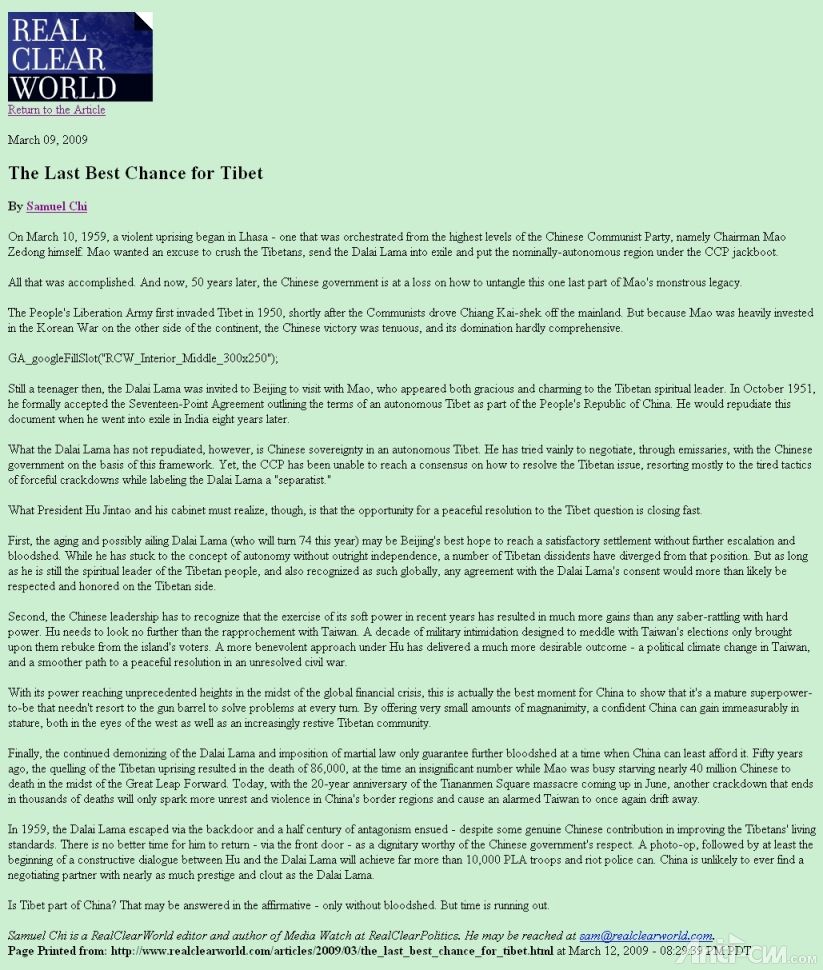【原文标题】The Last Best Chance for Tibet
【登载媒体】realclearworld.com
【来源地址】http://www.realclearworld.com/articles/2009/03/the_last_best_chance_for_tibet.html
【译者】荡漾
【声明】本翻译供Anti-CNN使用,转载请注明译者及出处,谢谢!
【译文】
1959年3月10日拉萨爆发了一场暴力起义,这是由中国共产党即毛泽东本人精心策划的最高级别行动。毛泽东需要一个借口镇压藏人、发配达赖喇嘛流亡,并将名义上自治的西藏地区纳入共产党的铁腕政权管辖。
这些目的全都达到。50年后的今天的中国政府困惑于如何解开毛泽东残暴政策的最后一笔遗留。
共产党将蒋介石赶出大陆后不久的1950年中国人民解放军首次入侵西藏。不过由于当时的焦点主要在于大陆另一边的朝鲜战争,中国在西藏的胜利并不显眼,其统治也几乎未得到认可。
当时不过十几岁的达赖喇嘛受邀前往北京会见毛泽东,这位藏族精神领袖眼里的毛泽东既亲切又富有魅力。1951年10月他正式接受了旨在承认自治的西藏是中华人民共和国一部分的17条协议。八年后当他流亡至印度对此做出了否定。
然而达赖喇嘛并未否定中国在自治的西藏地区的主权统治。他一直无奈地尝试在这一基础上与中国政府通过代表进行谈判。然而共产党仍未能就解决西藏问题达成共识,采取的主要手段是武力镇压的持久战,同时给达赖喇嘛贴上“分裂分子”的标签。
但胡锦涛主席及其内阁应该意识到在和平解决西藏问题的机会上时间已所剩不多。
首先,考虑到达赖喇嘛的年龄(今年将迎来74岁生日)及可能的健康变化,对中国来说这是无需进一步扩大事态、造成**而又令人满意地解决问题最好的希望。达赖喇嘛坚持非完全独立下的自治主张,与许多西藏异见人士已经产生了分歧。但只要他仍然是藏民的精神领袖,也在世界范围内得到认可,经达赖喇嘛同意而达成的任何协议都将可能得到更多来自西藏的尊重和承认。
其次,中国领导层必须意识到近些年软实力的演练收获的好处要比硬实力的武力威胁多得多。胡锦涛有必要从台湾问题的处理方式中学习点什么。十年来旨在通过武力威胁插手台湾选举的结果仅仅是换来岛内选民的指责。胡锦涛采取更为友善的方法已经收获了更加令人满意的结果:台湾的政治气候发生了改变,有望通过温和途径和平解决悬而未决的国内战争造成的台湾问题。
中国的力量在全球金融危机中达到前所未有的高度,实际上当前是中国展现无需动不动诉诸武力解决问题的超级大国成熟风范最好的时刻。一个自信的中国施以些许宽宏大量就能同时在西方和日益动荡的藏族眼里收获极高的道德威信。
最后,不断妖魔化达赖喇嘛及强施戒严令只有当中国有能力承担后果的时期才不至于造成更进一步的**。50年前镇压西藏起义造成86000人死亡,这一数字相比当时毛泽东操劳的大跃进中饿死的接近4千万中国人来说几近毫无意义。今年6月即将迎来又一场因残酷镇压造成数千人死亡的天安门广场屠杀20周年,这将只会在中国的边缘区激起更多的动荡和暴力事件,并将慌张的台湾再次推远。
1959年达赖喇嘛秘密逃离,半个世纪后尽管中国在提高西藏人民生活标准上真正做出了的贡献,对抗依旧继续。对达赖喇嘛来说没有比现在更好的机会以中国政府尊重的身份光明正大返回西藏。胡锦涛和达赖喇嘛之间若能开始富有建设性的对话,其结果至少要比超过1万解放军部队及防暴警察所能起到的作用大得多。中国几乎不可能找到威望及影响力能与达赖喇嘛相提并论的谈判伙伴。
西藏是中国的一部分吗?答案或许是肯定的,但只有在不发生**的前提下。不过时间不多了!
【原文】 (by Samuel Chi)
On March 10, 1959, a violent uprising began in Lhasa - one that was orchestrated from the highest levels of the Chinese Communist Party, namely Chairman Mao Zedong himself. Mao wanted an excuse to crush the Tibetans, send the Dalai Lama into exile and put the nominally-autonomous region under the CCP jackboot.
All that was accomplished. And now, 50 years later, the Chinese government is at a loss on how to untangle this one last part of Mao's monstrous legacy.
The People's Liberation Army first invaded Tibet in 1950, shortly after the Communists drove Chiang Kai-shek off the mainland. But because Mao was heavily invested in the Korean War on the other side of the continent, the Chinese victory was tenuous, and its domination hardly comprehensive.
Still a teenager then, the Dalai Lama was invited to Beijing to visit with Mao, who appeared both gracious and charming to the Tibetan spiritual leader. In October 1951, he formally accepted the Seventeen-Point Agreement outlining the terms of an autonomous Tibet as part of the People's Republic of China. He would repudiate this document when he went into exile in India eight years later.
What the Dalai Lama has not repudiated, however, is Chinese sovereignty in an autonomous Tibet. He has tried vainly to negotiate, through emissaries, with the Chinese government on the basis of this framework. Yet, the CCP has been unable to reach a consensus on how to resolve the Tibetan issue, resorting mostly to the tired tactics of forceful crackdowns while labeling the Dalai Lama a "separatist."
What President Hu Jintao and his cabinet must realize, though, is that the opportunity for a peaceful resolution to the Tibet question is closing fast.
First, the aging and possibly ailing Dalai Lama (who will turn 74 this year) may be Beijing's best hope to reach a satisfactory settlement without further escalation and bloodshed. While he has stuck to the concept of autonomy without outright independence, a number of Tibetan dissidents have diverged from that position. But as long as he is still the spiritual leader of the Tibetan people, and also recognized as such globally, any agreement with the Dalai Lama's consent would more than likely be respected and honored on the Tibetan side.
Second, the Chinese leadership has to recognize that the exercise of its soft power in recent years has resulted in much more gains than any saber-rattling with hard power. Hu needs to look no further than the rapprochement with Taiwan. A decade of military intimidation designed to meddle with Taiwan's elections only brought upon them rebuke from the island's voters. A more benevolent approach under Hu has delivered a much more desirable outcome - a political climate change in Taiwan, and a smoother path to a peaceful resolution in an unresolved civil war.
With its power reaching unprecedented heights in the midst of the global financial crisis, this is actually the best moment for China to show that it's a mature superpower-to-be that needn't resort to the gun barrel to solve problems at every turn. By offering very small amounts of magnanimity, a confident China can gain immeasurably in stature, both in the eyes of the west as well as an increasingly restive Tibetan community.
Finally, the continued demonizing of the Dalai Lama and imposition of martial law only guarantee further bloodshed at a time when China can least afford it. Fifty years ago, the quelling of the Tibetan uprising resulted in the death of 86,000, at the time an insignificant number while Mao was busy starving nearly 40 million Chinese to death in the midst of the Great Leap Forward. Today, with the 20-year anniversary of the Tiananmen Square massacre coming up in June, another crackdown that ends in thousands of deaths will only spark more unrest and violence in China's border regions and cause an alarmed Taiwan to once again drift away.
In 1959, the Dalai Lama escaped via the backdoor and a half century of antagonism ensued - despite some genuine Chinese contribution in improving the Tibetans' living standards. There is no better time for him to return - via the front door - as a dignitary worthy of the Chinese government's respect. A photo-op, followed by at least the beginning of a constructive dialogue between Hu and the Dalai Lama will achieve far more than 10,000 PLA troops and riot police can. China is unlikely to ever find a negotiating partner with nearly as much prestige and clout as the Dalai Lama.
Is Tibet part of China? That may be answered in the affirmative - only without bloodshed. But time is running out.
【截图】

|